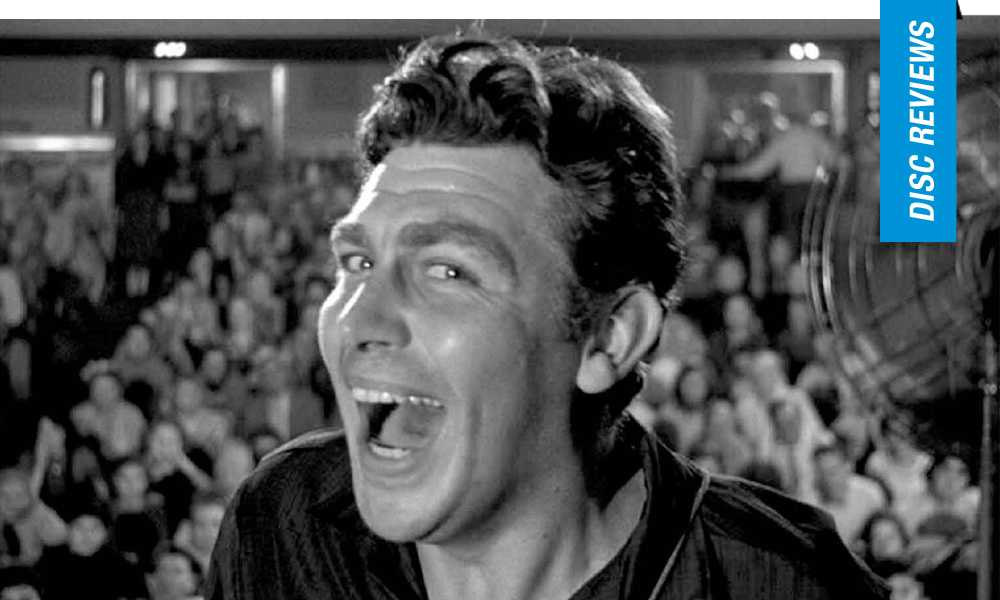As the grandiose anti-hero of Elia Kazan’s 1957 classic A Face in the Crowd, there are reasons the character and title are not as revered as other subjects from Kazan’s filmography, who reunited with his Oscar winning scribe Budd Schulberg from 1954’s Best Picture winner On the Waterfront and was fresh off equally seminal or noted titles East of Eden (1955) and Baby Doll (1956), a salacious Southern drama of sexual hysteria starring Carroll Baker (from a Tennessee Williams screenplay). And no, it’s not because Andy Griffith, in an aggrandizing debut, was not yet a star.
And while many of Kazan’s films were melodramas which either directly (Pinky, 1949) or roundaboutly (Waterfront) dealt with American social ills (and always much more adroitly than, say, a Stanley Kramer), the prescience of what he churned out in 1957 may have frightened the horses as far as predicting where the country was inevitably headed—no one wants to acknowledge the smoke until the fire’s lapping at their legs, as history all too often tells. And as far as the inextricable intertwining of politics and media into the circus dystopia the country smilingly jumped into circa November 2016, there’s nothing as resoundingly disturbing (in the cinematic realm) as what Kazan, Griffith, and a superb Patricia Neal succeed with here. And for whatever truth there is to Lonesome Rhodes and his cerebral mantra, there’s nothing more troubling than a man with extraordinary power directing his flock to be exactly as or stay exactly as they are.
Local Arkansas radio producer Marcia Jeffries (Patricia Neal) scours the rural wastelands for talent on her radio show “A Face in the Crowd.” She strikes gold when she stumbles upon Larry Rhodes (Andy Griffith), an enigmatic drifter holed up in drunk tank, unleashing the exact charisma and energy she’s looking for. Using his skill and cunning to navigate his way out of jail, audience responses to his appearance on the show lead Marcia to continue her collaborations with the man she coins Lonesome Rhodes. Before long, Lonesome becomes a formidable entertainment force, and a convenient puppet for conservative policy makers and politicians. While developing an intimate relationship with Marcia, Lonesome quickly takes advantage of the many women who begin competing for his attention, leading him to marry seventeen-year-old Betty Lou Fleckum (Lee Remick) while Marcia seeks solace with journalist Mel Miller (Walter Matthau), one of the few who is able to see through Lonesome’s insincerity. As her creation becomes a monster, Marcia takes drastic measures to squash the poisoned fruit she’s allowed to ripen.
And while history has also made us aware of Kazan’s alliances with his government over his peers, and arguably was in no way attempting to subvert the racial politics of the 1950s, the appearance of people of color in A Face in the Crowd is also of interest. Early on, Lonesome uses his burgeoning prestige to help a black woman collect funding via a television spot. She’s the last person of color we see until Lonesome’s decadent ascent into a Trump Tower sort of palace, wherein he has become an elitist who abuses and cajoles his black staff members. Whether intentional or not, it’s a sly nod to the careless obliviousness of power and white privilege—wherein the former is what allows for the full thrust of the latter (and is at least as sly as the final moments of the 1950 Michael Curtiz film The Breaking Point, in which Neal also headlines).
Disc Review:
Criterion presents A Face in the Crowd as a newly restored 4K digital transfer in 1.85:1 with uncompressed monaural soundtrack. Picture and sound quality are superb in this first major re-release of a film which was never properly released on DVD.
Ron Briley:
Criterion shot this informative twenty-minute interview with Ron Briley, author of The Ambivalent Legacy of Elia Kazan: The Politics of the Post-HUAC Films in 2018. Briley discusses the political implications of A Face in the Crowd in the context of Kazan’s career as well as inspirations for the character Lonesome Rhodes, such as Will Rogers and Arthur Godfrey.
Evan Dalton Smith:
Andy Griffith expert Evan Dalton Smith discusses the difficulties the actor had with his debut role and how it led to his portrayal of Sheriff Andy Taylor in The Andy Griffith Show in this nineteen-minute interview.
Facing the Past:
This twenty-nine-minute documentary from 2005 features Patricia Neal, Andy Griffith, Anthony Franciosa, screenwriter Budd Schulberg and film scholars Leo Braudy and Jeff Young as they discuss A Face in the Crowd.
Final Thoughts:
A powerful political satire echoing virulent manifestations of political corruption still alive and well today, A Face in the Crowd may be Elia Kazan’s most underrated and chilling portrait of America’s dark, ever-widening underbelly.
Film Rating: ★★★★½/☆☆☆☆☆
Disc Rating: ★★★★/☆☆☆☆☆

